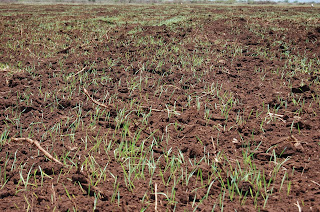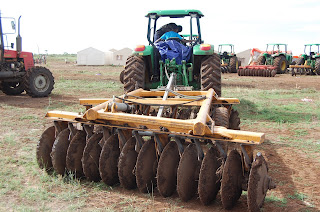It proved successful. Within a month and a half they had cleared about 5,000 acres. The piles of brush were soon burned.
and with purchased and hired local equipment we started to plow ground in preparation for planting.
We had placed an order for larger equipment that we were familiar with from the U.S. in December, but none of it had arrived.
John Deere model 1895 44' air drill (somewhere over the ocean)
These are 1 quintal sacks, 100 kg. (220lbs each)
Since there were no conventional type drills in Ethiopia we had to plant using a common method used by the larger farms in ET. This method is mix the seed with fertilizer and broadcast it on the ground with a fertilizer spreader, and then lightly covering it with a disk harrow.
Broadcast Spreader
Offset Disk Harrow
Covering the Seed
One week after planting (Wow! Warm weather makes a difference)
In the end of our first phase of development we now have 5,000 acres of ground cleared and 3,000 acres plowed and planted into wheat. We started planting wheat April 5 and finished April 21.
The area received a good amount of rain after planting and the condition of the crop looked good through the tillering stage of growth.
One month after planting.
As the crop approached the heading stage it was discovered that we had an infestation of Army Worms working on the grain.
Army Worm damage
The back pack sprayers were sent out again spraying insecticide. Some areas showed some major damage but most only had a little, for now anyway.
For the most part the crop looks good and the harvest will likely start arround August 1.
8 weeks
Reflecting back it has been quite an effort. To think what we started with just a short time ago it is amazing we got what we did accomplished. It has been very much a group effort, thanks to all.
Shelley and I are still in the U.S. awaiting ny fallout of the Ethiopian elections. For safety reasons this keeps us out of the country. Trying to mange things from a distance has been difficult. Wes and Alyssa have chosen to stay in ET with their children and are doing what they can to manage the farm. We have a good Ethiopian staff on the farm as well that makes it happen.
Shelley and I are still in the U.S. awaiting ny fallout of the Ethiopian elections. For safety reasons this keeps us out of the country. Trying to mange things from a distance has been difficult. Wes and Alyssa have chosen to stay in ET with their children and are doing what they can to manage the farm. We have a good Ethiopian staff on the farm as well that makes it happen.
We plan on rejoining the crew on farm by the first or second week in July. We have been busy planning and ordering equipment for the future. Here are some pictures of some of the equipment we are attempting to send to ET.
John Deere 9770STS w/630 grain head
JD 9530T
I'm thinking this "Bad Boy" should leave an impression on the local people.
I need to thank Shelley for updating the blog while I have been busy. What an experience this has been for both of us.












.JPG)

















